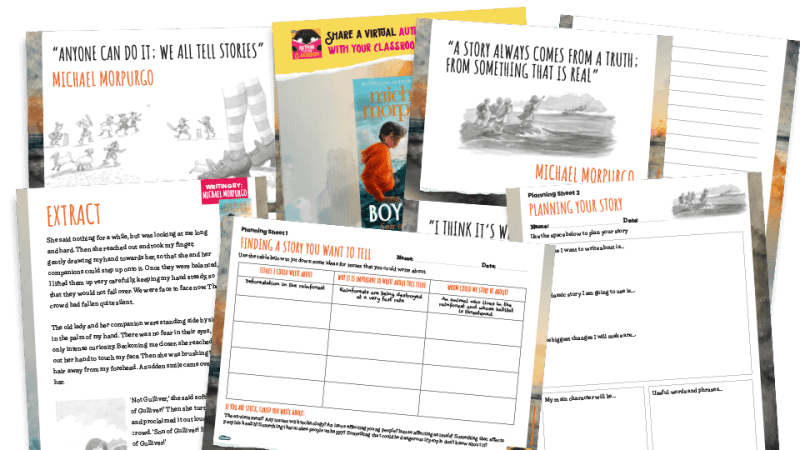A Dramatic Flourish – Use the forum theatre technique to help your pupils write more expressively

Using forum theatre, Christine Chen and Lindsay Pickton have a powerful method for helping children master the tricky art of showing, not telling… Ask your class to show you what ‘angry’ looks like, and they will probably be able to give you a good freeze-frame using eyes, eyebrows and mouths, possibly even chins and hands. […]

- by Lindsay Pickton and Christine Chen
- Authors, resource creators and co-founders of Primary Education Advisors Visit website

Using forum theatre, Christine Chen and Lindsay Pickton have a powerful method for helping children master the tricky art of showing, not telling…
Ask your class to show you what ‘angry’ looks like, and they will probably be able to give you a good freeze-frame using eyes, eyebrows and mouths, possibly even chins and hands. Then try ‘nervous’ – lips, eyes, body-language.
And yet, in their stories – “Sally was angry”; “Fred was nervous”. Not “Sally scowled, gritted her teeth and balled her hands into fists,” or “Fred chewed his lip, shoved his hands deeper into his pockets and looked down at his shuffling feet.” They tell, rather than show, despite all that lovely, dynamic drama.
Some children do reliably transfer drama into their writing, but it’s possible to have virtually all children do it all of the time. What is required is an adaptation of the forum theatre technique, and an understanding that language is acquired through imitation.
It’s worth repeating that last point, because in a typical classroom the gap between the language-rich and the language-disadvantaged can be enormous, which may lead us to think about ‘gifts’ rather than lucky experience. Children aren’t born with internal word banks; they have been fed by the extent to which they have been spoken and read to. Language is acquired through imitation, so let’s provide fantastic – and useful and appropriate – examples.
Let the children direct
When exploring a scene in a story, organise children in groups and give them a very brief amount of time to put a freeze-frame together that shows what characters are thinking / feeling at that point. Then, rather than spending most of the lesson looking at each group’s depiction, choose one group to show theirs while the rest become directors, their job to make the actors more effective.
Say to them, “How can we make Cinderella look even more sad?” Inevitably, your directors will show you the saddest faces and body language they can muster, to which you say, “These are the actors, you are directors. Tell her what she should do with her eyes / mouth / shoulders / hands!”
With encouragement and some modelling, they will start suggesting sighs, trembling lips, downcast eyes, slumped shoulders. Get these noted down on flipchart paper. Once you have whizzed through this process for the emotion / attitude of the other character(s) in the freeze-frame, say to the entire class, “Now do your freeze of the scene again, but make it better.” And it is always better – usually strikingly so. Stick that piece of flipchart paper somewhere prominent, and the children will have access to words and phrases that imply emotion and attitude, rather than just state it. They may need encouragement to borrow from these banks, so make a point of modelling their use during shared writing. Repeat the process for different scenes and characters, and the bank of useful expressions will expand. These displays might not look pretty, but they will significantly improve the quality of narrative writing.
Note also that this is not about ‘wow words’ or ambitious vocabulary; it’s not about replacing ‘sad’ with ‘miserable’ or ‘depressed’, but with ‘Wiped a single tear from her eye’ and ‘Her shoulders shook as she sighed’. This is about what’s appropriate and effective, rather than merely ambitious.
Support disadvantaged pupils
We know not every class contains children who can generate phrases such as ‘trembling lip’ and ‘slumped shoulders’, and that the process outlined above can feel like pulling teeth! If you do draw a blank, use the situation to introduce vocabulary. We have led forum theatres in fairly language-deprived classrooms – young KS1, very high free school meals, 70% EAL – and found ourselves stuck, asking, “What’s that she’s doing with her eyebrows? What’s that called? Eyebrows coming down and staring?’ and getting nothing. So we ‘seed’ – “Oh yes, scowling! Excellent word, let’s get that written down. Everyone, show me a scowl!” – and new vocabulary is effectively acquired. In one such classroom, using an early scene from The Rainbow Fish, the concisely expressive, ‘Looked over his shoulder and down his nose at…‘ was generated and ‘banked’ on flipchart paper. Every child was going to get that expression into his / her story once the writing phase got underway – and that’s a win, not a problem! Language is acquired through imitation; let’s close some gaps with the models we provide. The process works at least as well with more dynamic forms of drama, so long as the scenes are kept short. It’s tough to do a forum theatre with a five-minute scene, but fine with a 50-second one. Mime is particularly good for observing and enhancing some sort of transition; see Cinderella’s transformation or the Rainbow Fish’s realisation. When using ‘talking drama’, focus on the acting rather than the dialogue to generate effective words and phrases for character descriptions.
Well-rehearsed strategies
If you are confident in your use of drama and not already linking drama directly with language, we urge you to give it a go. If you are less confident in your use of role play, here’s a systematic approach you can try, developed through a dozen years of trial-and-error:
1 Choose a form of drama that is appropriate to the scene Talking drama is really hard to improvise if there are more than two in the scene; mime is great for showing change and development; freeze-framing is vital in chases, battles and other dynamic events
2 In paired improvisations, give each character a first line Otherwise some children can’t get started
3 Start with a shared re-reading of the scene Don’t rely on memory, even from yesterday
Trending
4 Be clear about the drama strategy to be used and what is expected Give some simple success criteria; think about eyes and eyebrows, mouths, shoulders, feet and the making or avoiding of eye-contact
5 In each group or pairing, allocate every child a number You can then say, ‘Ones are Jack, twos are the mysterious stranger”, thus avoiding argument over who gets to be who. Before their second – improved – attempt, swap the characters round
6 Give 30 seconds of seated planning time Tell them to quickly discuss how they are going to stand, look, move and interact
7 Give very limited time to ‘do’ the drama 45 seconds is more than enough for a freeze; 90 seconds is plenty for an improvisation. Tight time limits improve focus and therefore behaviour, but even if you have a good-as-gold class, very brief drama enables more language development. Remember, this is drama for literacy, rather than drama for its own sake
8 The individual or group chosen to be the focus of the direction don’t have to be good at drama But they do have to be okay with everyone staring and telling them how to change their interpretation. Avoid choosing children who might crumble!
9 Leading the forum theatre requires a lively connection with the class Having someone else transcribe the words and phrases (another adult, ideally) helps immeasurably.
10 Bring some grammatical terminology along for the ride “Looked? Is that the right verb? Ah, glanced – let’s get that down. Now, what’s the adverb?”
11 When groups do things better a second time, give specific feedback “Love the way you’re avoiding eye-contact now…”
12 If time allows, get some instant application of the drama and vocabulary in some incidental writing Not ‘writing the story’, but letters, diaries, dialogue related to the scene; instant application will help embed the language into children’s functional vocabulary
Using drama to explore a scene is wonderful for comprehension; using the forum theatre technique to direct and improve the drama also has the benefit of also improving the comprehension. If you aren’t doing it already, we passionately recommend banking those directions on some big bits of paper and encouraging their use in writing. Better drama, better comprehension and better composition – all in one!
Christine Chen (chris@primaryeducationadvisors.co.uk) and Lindsay Pickton (lindsay@primaryeducationadvisors.co.uk) are the co-founders of the London-based consultancy and training provider, Primary Education Advisors










